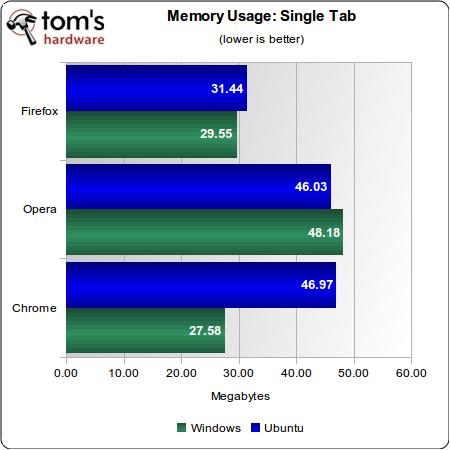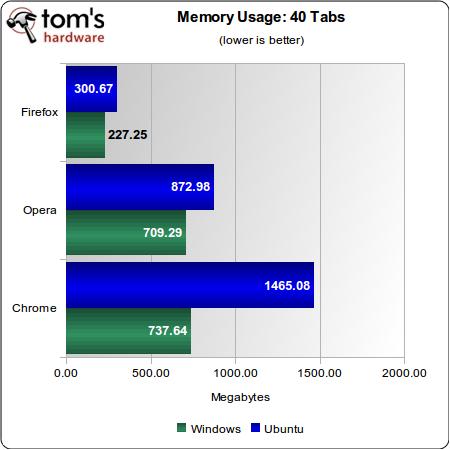Web Browser Grand Prix 2: Running The Linux Circuit
Last week we showed Opera 10.60 to be the world's fastest Web browser. That was in the Windows world. But where do Chrome, Firefox, and Opera stand in Linux? Today we find out. Adding the Win 7 results, we'll also learn which OS has the speediest browser.
Benchmark Results: Memory Usage
On this page we'll be looking for memory usage. We record the amount of system RAM allocated to the browser being testing using the GNOME System Monitor (Ubuntu's version of Windows Task Manager). Readings are taken after five minutes of the page(s) being fully loaded.
Single Tab
The Google homepage was used as the test page in the Single Tab test.
In Ubuntu, Firefox uses the least amount of system memory with only a single tab opened. Opera comes in a distant second, using nearly fifteen more MB than Mozilla. Chrome is right behind Opera with less than one more megabyte of RAM utilized. Firefox uses only two megabytes more in Linux than in Windows, while Opera uses two megs less in Linux. Google Chrome, however, used significantly more memory in Linux than in Windows. Twenty megabytes more. Not quite double, but close.
40 Tabs
The rest of the 40-tab test pages are made of the next 39 (after Google) most popular Web sites; according to Quantcast.
With the top 40 Web pages loaded, Firefox once again uses a fraction of the memory of the other contenders. Although Firefox for Linux uses seventy megabytes more than Firefox for Windows, the Linux peak usage is still way lower than any other Web browser on any platform.
Get Tom's Hardware's best news and in-depth reviews, straight to your inbox.
Opera takes second place with almost 850 MB, which is about 175 MB more than in Windows 7.
Chrome's memory usage with 40 tabs fully loaded is nearly off the charts. Google's RAM usage in Ubuntu 10.04 LTS is double what the search giant's browser uses in Windows 7. It's nearly a half gig beyond Safari's terrible showing in Windows! Needless to say, Chrome tanks the usage tests, but will its legendary memory management come through to save it in Linux?
Current page: Benchmark Results: Memory Usage
Prev Page Benchmark Results: Java And Moonlight Next Page Benchmark Results: Memory Management-
Tamz_msc The article that I was waiting for.How the tables have turned!Reply
Conclusion:Firefox is quite capable in both Linux and Windows.
I'm using Firefox 4 beta and I find it pretty quick. -
micr0be yes i would have loved to have seen the firefox 4 beta with the results. although great article.Reply -
adamovera weirdguy99Why not put firefox 4 into the equation?micr0beyes i would have loved to have seen the firefox 4 beta with the results. although great article.When it's final, I'll test it.Reply -
Tamz_msc DamdamanI'll get berated for this I'm sure but will we see an OSX article on browsers as well?You are kidding,right?Reply -
arnweb Opera Turbo feature, is not mentioned here, it can boost speed in real surf. And also when we open a closed tab in Opera it opens them instantly, that's why Opera holds memory for closed, tab.Reply -
Sihastru Opera still can't render pages properly, still can't print content properly, and we waste our time with senseless tests of imperceptible speed.Reply -
The_King I dont think anyone using firefox will change to another browser even if it is Faster. I love my firefox :)Reply -
Tamz_msc arnwebOpera Turbo feature, is not mentioned here, it can boost speed in real surf. And also when we open a closed tab in Opera it opens them instantly, that's why Opera holds memory for closed, tab.Opera Turbo increases page load times on slow connections.On my 2Mbps connection the time in which Opera Turbo connects to its servers is the time in which Google loads in Firefox.Reply

